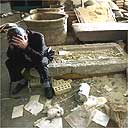 Iraqi National Museum Deputy Director Mushin Hasan holds his head in his hands as he surveys the debris of looted and destroyed artifacts. Photo: Mario Tama/Getty
Iraqi National Museum Deputy Director Mushin Hasan holds his head in his hands as he surveys the debris of looted and destroyed artifacts. Photo: Mario Tama/Getty But once you remove an object from its cultural and social context, it has little or no meaning; Roger Attwood says:
The information given by a prisoner while he is being tortured is unreliable. So is the information given by a looted antiquity; it has been wrenched from its archaeological context and stripped of its basic history. In certain instances, even its authenticity cannot be definitively ascertained.Cuno claims that looting of antiquities is fuelled by poverty and war; but Attwood points out that Italy has a big problem with looters, and it is one of the richest countries in the world - so what is fuelling the looting is the existence of a market for the stolen items. What's more, says Attwood, much of that market is museums, and the museums act as trend-setters for collectors, who then donate their illicit antiquities to museums in exchange for tax breaks.
Cuno also says:
"If undocumented antiquities are the result of looted (and thus destroyed) archaeological sites, that there is still a market for them anywhere is a problem. Keeping them from U.S. art museums is not a solution, only a diversion."So he is effectively saying that people steal stuff, so we might as well buy it off them. That reminds me of the humorous saying: "Property is theft; theft is property; therefore it's mine."
The laws that are in place are there to protect ancient sites from looters. Once an item is looted and removed from its context, its ability to tell us anything about the culture it came from is severely curtailed. (Oddly, human bones with doubtful provenance can still be used to provide data on their population of origin, since they have minerals in them which can identify where they came from; but more information can be gleaned from them if they have a provenance.)
As an example of what happens when the context of an object is lost, consider the Mediterranean pottery found at Tintagel. This pottery tells us that there were trade links between the Mediterranean and North Cornwall in the "Arthurian" period (6th century CE), which means that Tintagel is a site of international importance. If the information that it came from Tintagel was lost, it would become just another bunch of pot-sherds, and Tintagel would be correspondingly greatly diminished.
Another (hypothetical) example: if a votive statue of Mercury was found in a Roman temple, that would tell you the dedication of that temple; or if it was found in a Roman house, perhaps buried in a wall cavity with coins of a certain date, it might provide evidence of paganism continuing into the Christian era; but if it was just dug out of the ground and this contextual information was lost, we would not know of the temple dedication or the existence of clandestine paganism.
Of course, the majority of items in museums have a respectable provenance. But museums and archaeology should maintain squeaky-clean procedures for the acquisition of antiquities, otherwise it undermines their authority in these matters.
Further reading
- Saving Antiquities For Everyone (SAFE): James Cuno's Illogic
- Archaeology: Insider: Guardians of Antiquity?
- Looting matters: James Cuno on Antiquities
- Afrikanet: Review of James Cuno’s Who Owns Antiquity? by Dr. Kwame Opoku
- Roger Atwood (2004), Stealing History: Tomb Raiders, Smugglers, and the Looting of the Ancient World.
- C & G Scarre (2006), The ethics of archaeology: philosophical perspectives on archaeological practice

No comments:
Post a Comment